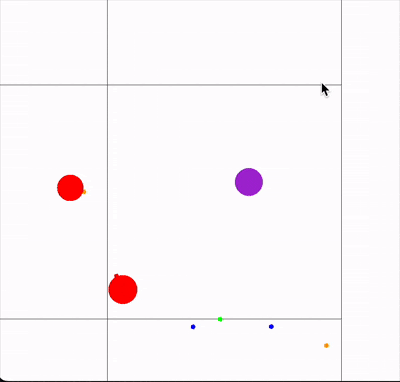Basic Usage¶
Self-Play setup¶

In order to play the game yourself or enable rendering in the gym environment, you will need to build the game client yourself on a system where OpenGL has been installed. Issue the following commands:
git submodule update --init --recursive
mkdir build && cd build
cmake -DCMAKE_BUILD_TYPE=Release ..
make -j 2 client agario
This will output an executable named client in the directory agario
agario/client
Use your cursor to control the agent
Interacting with the Environment¶
Initializing a random environment¶
import gymnasium as gym
import gym_agario
config = {
'arena_size': 500, # Size of the arena
'num_pellets': 500, # Number of pellets
'pellet_regen': True, # Pellet regeneration
'num_viruses': 25, # Number of viruses
'num_bots': 25, # Number of bots
'grid_size': 256, # Size of the grid
'obs_type': "grid", # Observation type
'num_agents': 1, # Number of agents (fixed at 1)
'c_death': -100, # Death penalty
}
env = gym.make("agario-grid-v0", **config)
env.reset()
env.seed(0)
episode_over = False
while not episode_over:
action_space = gym.spaces.Box(low=-1, high=1, shape=(2,)) # (x, y) - action space for agent's navigation
action = (action_space.sample(), np.random.randint(0, 3)) # ((x,y), action)
observation, reward, terminated, truncated, info = env.step(action)
episode_over = terminated or truncated
env.close()
Recording and Saving Videos¶
AgarCL provides functionality to record and save videos of the environment’s execution. This is useful for visualizing agent behavior or debugging.
Enabling Video Recording¶
To enable video recording, set the record_video parameter to True in the environment configuration. You can also enable video recording programmatically:
env.enable_video_recorder()
Saving the Video¶
To save the recorded video, use the generate_video method:
env.generate_video('path_to_save_video', 'video_name.avi')
This will save the video to the specified path with the given file name.
Disabling Video Recording¶
To stop recording, use the disable_video_recorder method:
env.disable_video_recorder()
Example Usage¶
Here is an example of how to record and save a video:
import gymnasium as gym
# Initialize the environment
env = gym.make("agario-screen-v0", render_mode="rgb_array")
# Enable video recording
env.enable_video_recorder()
# Reset the environment
env.reset()
# Perform some steps
for _ in range(100):
action = [(env.action_space.sample(), env.action_space.sample())]
observation, reward, terminated, truncated, info = env.step(action)
if terminated or truncated:
break
# Save the video
env.generate_video('videos', 'example_run.avi')
# Disable video recording
env.disable_video_recorder()
env.close()
Real-Time Render View¶
Display the environment in a live GUI window for debugging, demos, and visually tracking your agent’s decisions as they happen.
Example Usage¶
An example of how to invoke the window:
import gymnasium as gym
# Initialize the environment
env = gym.make("agario-screen-v0", render_mode="human")
# Reset the environment
env.reset()
# Perform some steps
for _ in range(100):
action = [(env.action_space.sample(), env.action_space.sample())]
observation, reward, terminated, truncated, info = env.step(action)
# Update the on-screen display
env.render()
if terminated or truncated:
break
env.close()
This functionality allows you to capture and analyze the agent’s performance visually.
More information¶
See the Environment Details page